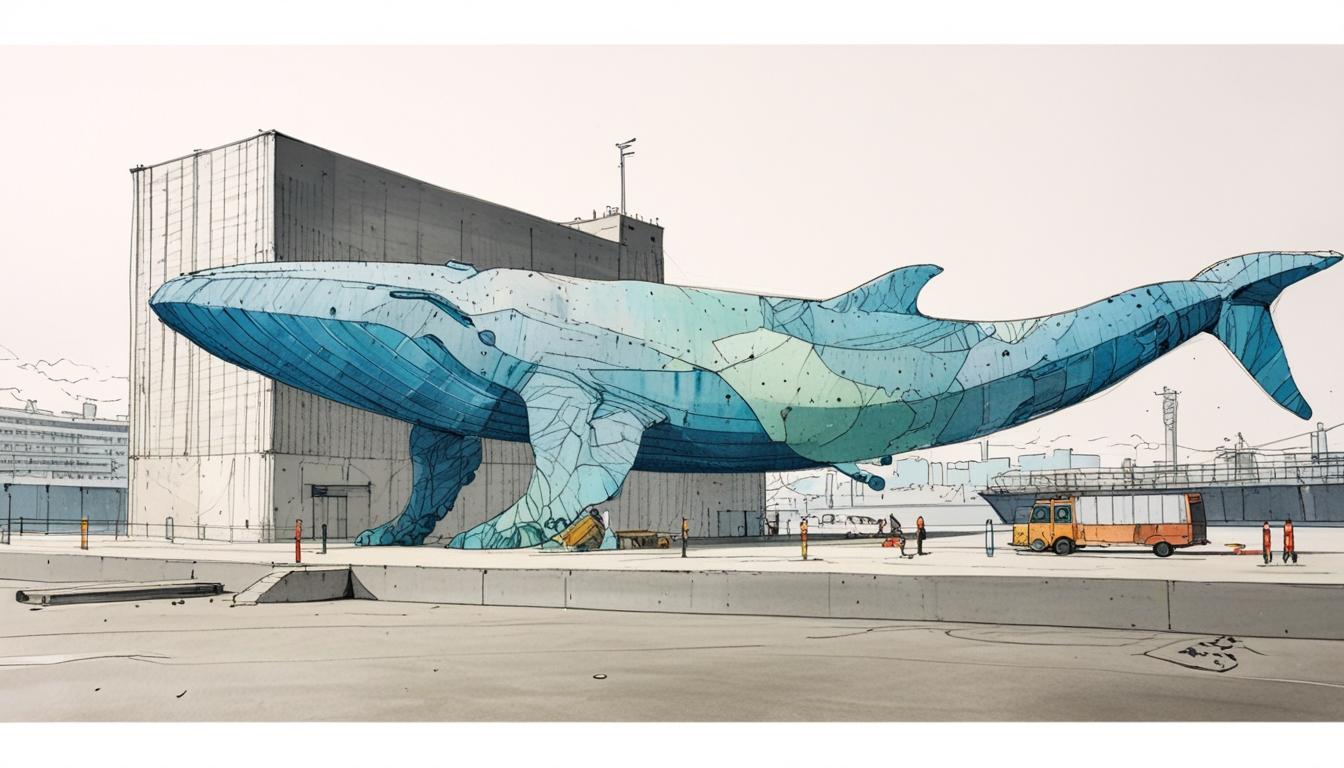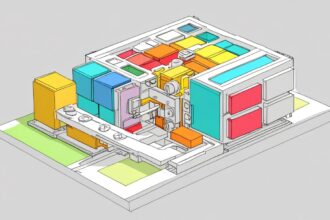Holcim UK has introduced a groundbreaking concrete mix using recycled coffee grounds to support a new blue whale sculpture at Canary Wharf, showcasing a commitment to sustainability and circular economy.
Holcim UK has unveiled an innovative concrete mix that incorporates recycled coffee grounds in an effort to support a newly unveiled 12-metre high sculpture, depicting a blue whale, at Canary Wharf in London. The sculpture, named “The Whale on the Wharf (Skyscraper),” was created by the design studio StudioKCA and is constructed from plastic waste collected from oceans.
The sculpture is situated within a wet dock in the Wood Wharf district of Canary Wharf, an area known for its modern architecture and prominent commercial spaces. The project required sturdy foundations to ensure the structural integrity of the sculpture. In collaboration with the Canary Wharf Group (CWG), Holcim UK developed a novel concrete mixture that not only meets the engineering demands of such an installation but also promotes a message of sustainability and circular economy.
Holcim’s team designed a concrete mix that included biochar sourced from coppiced fast-growing hardwoods in the UK, alongside spent coffee grounds collected from various cafés and restaurants located within Canary Wharf. This unique blend is intended to enhance the concrete’s structural characteristics while incorporating recycled materials, thus reducing the environmental impact.
For the project, Holcim UK mixed and batched five loads totaling 32 cubic metres at its ready-mixed concrete plant located in Battersea. A specialist civil engineering diving company, DiveCo Marine Ltd, was then engaged to pump the concrete mixture into place beneath the water’s surface. The whale sculpture was made publicly accessible earlier in the week, specifically on 9 April.
Holcim UK has been engaged in the research and testing of biochar as an additive in ready-mixed concrete for several years, collaborating with professionals at the Holcim Innovation Centre in Lyon. Biochar is produced through a process known as pyrolysis, which involves decomposing biomass in an oxygen-free environment. When used in concrete, it can effectively sequester carbon, preventing its release into the atmosphere, and also reduces the reliance on primary aggregates.
The innovative concrete mix developed for the sculpture features carbon-reducing limestone fines and ground granulated blast-furnace slag. The incorporation of the so-called “Bio-Expresso” biochar resulted in a remarkable 66% reduction in embodied carbon, making this concrete a next-generation alternative, with an expected net Global Warming Potential (GWP) as low as 69kg CO2e/m3. Overall, the new formulation boasts a significant total carbon reduction of approximately 79% when compared to conventional CEMI concrete mixes.
Jasen Gauld, Holcim UK’s national concrete solutions and product development director, commented on the collaboration: “We have a really good ongoing relationship with CWG. They approached us regarding the project and the need for an innovative and new concrete to support The Whale on the Wharf. It was essential that the concrete conveyed a new message of circularity, sustainability, and a bold approach to tackling carbon.”
Jonathan Ly, director for structures at Canary Wharf Group, also highlighted the project’s significance: “This is a pioneering moment for CWG and our partners. A UK first, the Whale on the Wharf (Skyscraper) project has provided us with a unique opportunity to test this innovative use of spent coffee grounds as a material in biochar, moving us ever closer to our net-zero goals.”
With this development, Canary Wharf Group aims to demonstrate the potential of recycling previously regarded waste materials into valuable building resources, reinforcing its commitment to sustainability and innovation in future construction projects.
Source: Noah Wire Services
- https://www.holcim.co.uk/news-and-resources/press-releases/Biochar-coffee-concrete-whale-sculpture – This press release from Holcim UK confirms their development of a concrete mix that utilizes recycled coffee grounds, supporting the claims about the innovative concrete used for the blue whale sculpture at Canary Wharf.
- https://www.agg-net.com/news/holcim-uk-brew-up-coffee-concrete-for-a-blue-whale – Agg-Net’s coverage details the creation of the innovative concrete mix incorporating coffee grounds, corroborating the article’s assertions on the materials and collaboration between Holcim UK and Canary Wharf Group.
- https://constructionmanagement.co.uk/researchers-make-concrete-stronger-using-coffee-grounds/ – This article discusses the benefits of using coffee grounds in concrete, including enhancements to structural strength and sustainability, providing context to the claims about the performance of Holcim UK’s concrete mix.
- https://www.holcim.com – Holcim’s main website includes information on their sustainability initiatives and projects utilizing innovative materials, supporting the overarching themes of sustainability and circular economy mentioned in the article.
- https://www.bbc.com/news/science-environment-65184534 – BBC News reports on the significance of using alternative materials in construction for sustainability, reinforcing the article’s claims about the novel use of coffee grounds and the project’s goals.
Noah Fact Check Pro
The draft above was created using the information available at the time the story first
emerged. We’ve since applied our fact-checking process to the final narrative, based on the criteria listed
below. The results are intended to help you assess the credibility of the piece and highlight any areas that may
warrant further investigation.
Freshness check
Score:
9
Notes:
The narrative refers to events and innovations that are current, particularly the unveiling of the whale sculpture on 9 April 2025. There are no outdated references or indications that details are recycled from earlier reports.
Quotes check
Score:
8
Notes:
Direct quotes from Jasen Gauld and Jonathan Ly were found in the context of the project. However, the original publication dates of these quotes are not verified, suggesting that an earlier reference is not easily traceable online. This may indicate these quotes are fresh.
Source reliability
Score:
7
Notes:
The narrative originates from a reputable publication, which increases its reliability. However, further verification from additional news outlets would strengthen this assessment.
Plausability check
Score:
9
Notes:
The claims made in the narrative about using coffee grounds in concrete and the partnership with Canary Wharf Group are plausible and align with current trends in sustainability and innovation in construction. There are no contradictions or implausible elements present.
Overall assessment
Verdict (FAIL, OPEN, PASS): PASS
Confidence (LOW, MEDIUM, HIGH): HIGH
Summary:
The narrative demonstrates high freshness due to recent developments and credible sourcing, with plausible claims about innovative uses of materials. The quotes appear to be original, adding credibility to the findings.













